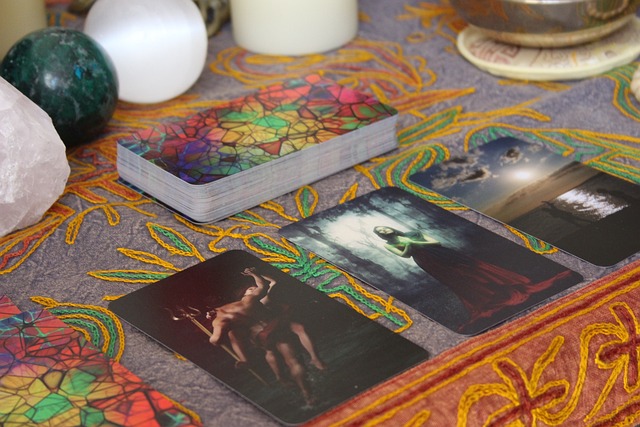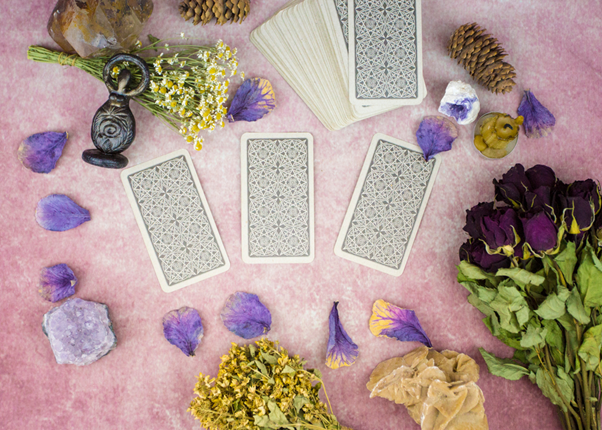
A list with tarot cards is a useful tool to learn the meaning of each card. You will be able to identify the major or minor arcanas and which cards correspond with which suits. This will help you quickly and accurately read your cards. You can also learn the meaning of the different tarot suits and trumps.
78 Tarot card cards
A deck of Tarot cards contains 78 cards. It includes 56 Minor Arcana or Major Arcana cards, as well as 22 Major Arcana. Each card has a detailed description and is divided into two groups. There are 22 Major Arcana cards numbered from 0-21. The Minor Arcana cards consist of the same cards, but they are in reversed order. Tarot cards date back to the Renaissance. Tarot cards have been used for occultism and fortune telling.

78 Tarot Card Meanings
You may not be familiar with the meanings of the 78 Tarot cards if you're a beginner. A book can be a great way to learn how the cards should be read. These books will teach you how to read the cards and help you understand different divination strategies.
78 tarot-card suits
Tarot cards come in two groups, called Arcanas. The Major Arcana includes the 22 trump card, which are your most significant influences and revelations. The remaining 13 cards make up the Minor Arcana. Each card represents a different aspect of your life. It represents your emotions, thoughts, and actions.
78 tarot-card trumps
These cards are known as the Tarot. They have been used for divination since the Middle Ages. A typical deck includes 78 cards. Each card in a deck has its own meanings and symbolism. You'll learn more about the meanings of the cards as you become more familiar with them. For example, the Fool represents the start of a journey, childlike wonder, and potential. The Magician symbolizes healing and spirituality.
78 tarot card reversals
Tarot card reversals can be difficult to interpret. They can be confusing because they could have different meanings. While some reversals signify the end of a cycle or a learning experience, others may signal an important change. The reversal of the Four of Cups can represent grief or loneliness. However, the Four of Cups may be reversed to signify spiritual growth or a lesson in karmic.

78 tarot card pictures
Tarot card pictures depict the many aspects of our psyches and illuminate the cycles in life. The future is not something a reader can predict, but tarot card images can offer guidance to help you make it through the present moment. The 78 images represent different aspects in your life.
FAQ
What are competitive hobbies, you ask?
Swimming, running, cycling, golfing and tennis are some of the competitive sports.
They're often enjoyed by people who are active and want to socialize.
If you have a hobby that involves physical activity, then you'll probably find that there are other people around who share this interest.
This may mean joining a club or group where you meet regularly to play sports together.
You could also opt to take part in team games that involve playing alongside others.
These include netball (soccer), football (cricket), netball (basketball), hockey, baseball, volleyball and badminton.
There are many kinds of competition.
Some competitions can be used for only recreational purposes.
Others are meant to test competitors' skills.
Others are also designed to reward exceptional performance.
These cases award prizes to the winners.
Other competitions are meant to test competitors' strength and stamina.
These are endurance events.
For example, marathon races, triathlons, Ironman Triathlon, etc.
Athletes train hard before they compete in these events.
To prepare them mentally and physically, they will be following a strict training regimen.
They may also need to spend some time away from home during preparation.
It's important not to forget that not all athletes are able to compete in every type event.
What are some free resources I can use to learn more about hobbies
There are many websites dedicated to helping people discover new hobbies.
Here are some of our favorites:
www.trythisathome.com - This site provides a list of over 100 different hobbies. This site also contains information on how you can get started with each of them.
www.hobbyfinders.org -- This site provides a searchable database of thousands upon thousands of hobbies that you can browse by skill level, location and interest.
www.indiebazaar.co.uk - IndieBazaar is an online marketplace designed specifically for independent artists and musicians. This site offers hundreds of products, ranging from artwork and music gear.
www.pinterest.com/explore/hobbies - Pinterest is a social media network that lets users "pin" images they find interesting onto their boards. Users can organize the things they like in specific categories with boards.
www.reddit.com/r/Hobbies Reddit enables users to post links and articles, as well as videos, on other social media platforms like Facebook. Voting is available for users to choose the most valuable posts.
What are some great hobbies?
Doing something you enjoy is the best hobby. It will be easier to continue doing what you love if you are passionate about your work. If you don't feel well or tired, you will always have an excuse!
We all have hobbies that we love and know. These include painting, crafting, photography, cooking and sports.
Consider volunteering at your local animal shelter, charity shop, hospice, children's hospital or hospice, elderly care home, school center, church, or community center.
Let's say you are looking for something more exciting. Why not take up scuba diving, rock climbing, sky diving, bungee jumping, white water rafting, sailing, surfing, canoeing, kayaking, horse riding, zip lining, hang gliding, paragliding, skydiving, snowboarding, skiing, mountain biking, hiking, camping, fishing, hunting, archery, shooting, clay pigeon shooting, target shooting, golf, tennis, swimming, snorkeling, windsurfing, waterskiing, kitesurfing, wakeboarding, standup paddle boarding, hang gliding, parasailing, hot air ballooning, paragliding and many more.
There are many other ways to spend time outside. These include caving.
What are some enjoyable hobbies for seniors
Senior citizens need to find things they like doing. Senior citizens should keep active through participation in physical and sports activities.
They may be interested in joining clubs to find people with similar interests. They'll be less lonely as they get older.
Seniors should also keep up with the latest trends. For example, seniors could keep up with the latest fashions, art and literature.
How do I get started?
The first step toward starting any new hobby is to decide what kind of activity you'd like to pursue.
Passion is key once you have chosen your topic.
It is essential to understand the reasons you want to start a hobby. It will give you some direction and purpose.
Once you have determined what hobby you wish to pursue, you can plan your next steps.
You should think about the equipment you'll need.
Consider whether classes or seminars are necessary.
Make sure you have enough space for your hobby.
A club or group might be something you consider. These groups are often supportive and offer advice.
Consider how much money you would have to spend on your hobby.
Can I make money by my hobby?
You can make extra money by taking up hobbies.
If your hobby is something you love, you might decide to make a living selling it.
If you are a stamp collector, you might want to start a website that sells rare stamps.
This way, you can earn extra income without having to go through the hassle of actually buying and selling the stamps.
Another option would be to create a YouTube channel where you talk about your hobby.
This allows you to share what is important to you with others, and possibly generate additional revenue through premium content.
What's a hobby for children?
Anything kids like to do that is not part of their daily routine is a hobby. They might like to draw pictures, build things, paint, write stories, play with toys, read books, watch TV, listen to music, play computer games, ride bikes, skateboard, swim, climb trees, run around outside, play football, basketball, volleyball, rugby, cricket, baseball, soccer, hockey, dodgeball, rounders, tag, hide and seek, hopscotch, marbles, jump rope, hopscotch and many others.
Parents worry that their children might get in trouble if they are allowed to do what they like. However, this is not always true. They won't get into trouble if your child is safe and does not cause harm to others or themselves.
It's important to remember that just because they like to do something doesn't mean that they'll always choose to do it. They might decide to draw instead of write if they enjoy drawing pictures.
There are lots of different types of hobbies out there, so it's really up to you to pick one that you enjoy most.
Statistics
- A new survey by Pew Research Center of teens ages 13 to 17 finds that 36% of girls feel tense or nervous about their day every day; 23% of boys say the same. (pewresearch.org)
- The intensity of the dialogue partners' bond at the end of the forty-five-minute vulnerability interaction was rated as closer than the closest relationship in the lives of 30 percent of similar students. (time.com)
- Almost 80% of people claim to have no hobby. (hobbylark.com)
- 37% Video Games 36% Travel 36% Health and Fitness (quizexpo.com)
- I am 100% biologically a woman (discover.hubpages.com)
External Links
How To
How to get started gardening
Gardening is one among the oldest forms. It takes patience, persistence, determination, and perseverance. The first step in starting your own garden is choosing a location where you want to grow food. It could be large land, or just your backyard. Next, choose what kind of plants you would like to grow. Do you prefer flowers over vegetables? Some people love to grow herbs, while others enjoy raising animals like rabbits. Before you decide which crops you will plant, consider the amount of space you have. You might consider growing berries or fruits if you live in a cold climate.
Once you have selected the plants you wish to plant, you should prepare your soil. It is vital that your soil is prepared properly to determine whether or not your plants will thrive. Good quality soil contains organic matter that helps feed your plants' roots. Organic matter includes leaves, twigs (grass clippings), manure, compost, and manure. You need nutrients to your soil after you have prepared it. Depending on the type of plants you plan to grow, you may need different amounts of nitrogen, phosphorus, potassium, calcium, magnesium, boron, zinc, copper, manganese, iron, molybdenum, chlorine, sulfur, sodium, and so on. You can calculate these values online with a fertilizer calculator. There are many fertilizers on the market, so ensure you understand what you are buying.
Now you need to wait for the seeds to germinate. The process typically takes 2 to 3 weeks depending on the weather conditions and temperature in your area. Once your seeds have sprouted, you need to water them regularly. Too much or too little water can cause problems. Make sure to give your plants water at regular times and not overwater. Overwatering can lead to root rot and fungal diseases. When watering your plants, remember that most plants require less water during the warm summer months than in winter. Keep in mind that certain plants may need to be dried after being watered. Tomatoes, for example, need to be kept moist but not too wet. Soggy soil is not good for them. After they have finished flowering, they must go dormant. When plants stop producing new growth, they go dormant and start storing energy for next season's harvest. Dormancy occurs when the plant stops sending signals that tell its roots to produce food. During this period, plants continue to store energy. However, if the temperatures drop below freezing and there isn't enough sunlight, the plant will go to sleep.
Living in urban areas may restrict the types of plants you can plant. Concrete sidewalks, roads or parking lots can block sunlight from reaching urban areas. Concrete absorbs light which blocks sunlight from reaching the ground below. This is why many plants cannot thrive in cities. There are still plants that thrive in urban environments. Many trees, shrubs and perennials can thrive in urban environments. Many annuals can be grown indoors, too, in containers. You can have fresh greenery all year round with container gardens.
Now that you have decided where to place your garden, chosen what you will grow, and prepared your soil, you are ready to plant!